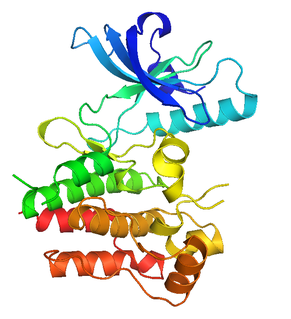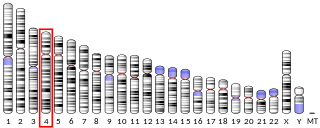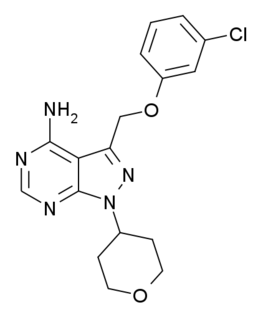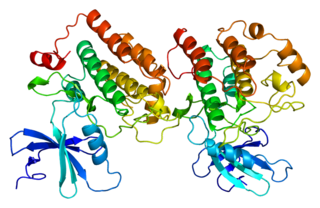Casein kinase is a kinase enzyme.
| This biochemistry article is a stub. You can help Wikipedia by expanding it. |
Casein kinase is a kinase enzyme.
| This biochemistry article is a stub. You can help Wikipedia by expanding it. |
Casein pronounced "kay-seen" in British English, is a family of related phosphoproteins. These proteins are commonly found in mammalian milk, comprising c. 80% of the proteins in cow's milk and between 20% and 45% of the proteins in human milk.The j Casein has a wide variety of uses, from being a major component of cheese, to use as a food additive. The most common form of casein is sodium caseinate.

MuSK is a receptor tyrosine kinase required for the formation and maintenance of the neuromuscular junction. It is activated by a nerve-derived proteoglycan called agrin.
The Casein kinase 1 family of protein kinases are serine/threonine-selective enzymes that function as regulators of signal transduction pathways in most eukaryotic cell types. CK1 isoforms are involved in Wnt signaling, circadian rhythms, nucleo-cytoplasmic shuttling of transcription factors, DNA repair, and DNA transcription.
Casein kinase 2 (CK2/CSNK2) is a serine/threonine-selective protein kinase that has been implicated in cell cycle control, DNA repair, regulation of the circadian rhythm, and other cellular processes. De-regulation of CK2 has been linked to tumorigenesis as a potential protection mechanism for mutated cells. Proper CK2 function is necessary for survival of cells as no knockout models have been successfully generated.

A serine/threonine protein kinase is a kinase enzyme that phosphorylates the OH group of serine or threonine. At least 125 of the 500+ human protein kinases are serine/threonine kinases (STK).
Casein kinases may refer to:

The CSNK1D gene encodes the casein kinase I isoform delta enzyme in humans.
Casein kinase I isoform epsilon is an enzyme that in humans is encoded by the CSNK1E gene.

Casein kinase II subunit alpha is an enzyme that in humans is encoded by the CSNK2A1 gene.

Casein kinase II subunit alpha' is an enzyme that in humans is encoded by the CSNK2A2 gene.

Cyclic AMP-dependent transcription factor ATF-1 is a protein that in humans is encoded by the ATF1 gene.

Casein kinase II subunit beta is a protein that in humans is encoded by the CSNK2B gene.
In enzymology, a low-density-lipoprotein receptor kinase is an enzyme that catalyzes the chemical reaction

Mitogen-activated protein kinase kinase kinase 1 is an enzyme that in humans is encoded by the MAP3K1 gene.

Alpha-S1-casein is a protein that in humans is encoded by the CSN1S1 gene.

Casein kinase I isoform alpha is an enzyme that in humans is encoded by the CSNK1A1 gene.
CK2 can refer to the following:

PF-4800567 is a drug developed by Pfizer which acts as a selective inhibitor of the enzyme Casein kinase 1 epsilon (CK1-ε), and has mainly been used in the study of the casein kinase 1 enzymes in the regulation of circadian rhythm, as well as showing potential neuroprotective effects. While this research has shown that circadian rhythm is modulated primarily by the alternate isoform CK1-δ rather than CK1-ε, both PF-4800567 and the related non-selective CK1-δ/ε inhibitor PF-670462 were found in animal studies to enhance responses to certain drugs of abuse such as methamphetamine and fentanyl, which suggests a role for CK1-ε in negative regulation of sensitivity to stimulant and opioid drugs.

Casein kinase I isoform epsilon or CK1ε, is an enzyme that in humans is encoded by the CSNK1E gene. CK1ε is a serine/threonine protein kinase and is very highly conserved; therefore, this kinase is very similar to other members of the casein kinase 1 family. This gene is a major component of the mammalian oscillator which controls cellular circadian rhythms.

Silmitasertib (INN), codenamed CX-4945, is a small-molecule inhibitor of protein kinase CK2, a constitutively active serine/threonine-specific protein kinase that is overexpressed in several types of tumors.